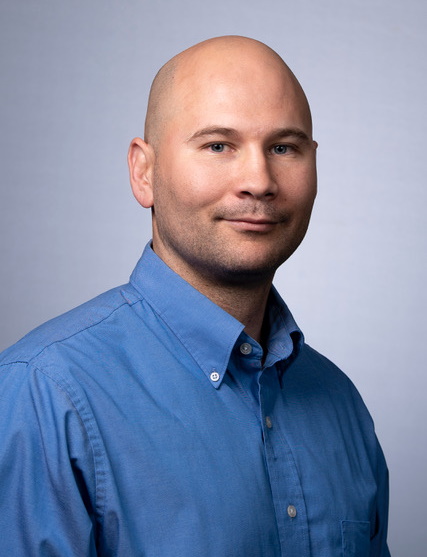Social Work doctoral student first at Wayne State to be selected for elite research leadership program
Seth Allard, a doctoral student in Wayne State University’s School of Social Work Doctoral Program, recently became the university’s first-ever recipient of a prestigious four-year Health Policy Research Scholars Program fellowship. The program is funded by the Robert Wood Johnson Foundation and coordinated by Johns Hopkins.
 The program, which is built around a “cultures of health” framework, helps students apply their work to policies that advance equity and health while building a diverse network of leaders who reflect our changing national demographics and the urgent need for a critical lens in health research.
The program, which is built around a “cultures of health” framework, helps students apply their work to policies that advance equity and health while building a diverse network of leaders who reflect our changing national demographics and the urgent need for a critical lens in health research.
Allard will be pursuing interdisciplinary and transcultural research on chronic health issues, specifically related to suicide and mental health, within the military and Native American communities. He can relate to both groups, as he is a United States Marine Corps (USMC) veteran and a member of the Sault St. Marie Tribe of Chippewa Indians (Ojibwa).
When he found out he won the fellowship, his first reaction was “It’s go time!”
“The program provides four years of support for independent research, intensive and specialized training, development, and mentorship in policy research, and perhaps most importantly, a cohort of like-minded individuals worldwide,” Allard said.
As a member of the Ojibwa tribe, his personal experiences inspired him to study the unique health disparities of Native American communities.
“Indigenous communities face a cycle of interrelated problems that stem from historical trauma and colonial practices, such as extreme poverty, drug and alcohol use, injured family and community relationships, and a loss of spiritual and cultural practices. Overcoming these issues is not impossible, and the work of many elders and helpers in my community continue to inspire and teach me a path forward, or what we call ‘The Red Road.’ It’s essential to braid our knowledge and strengths into the research that takes place in our community, so that future public health strategy is more effective and representative of our needs and those of our youth.”
His experience as a Marine also helped to shape his current career path.
“I understand the realities that service members, veterans, and their families face, and how much advocacy is still needed to help the military community lead their best lives. My personal experience directly contributed to my interest in the topic of mental health and suicide in the military. Deploying overseas and interacting with the military and VA healthcare systems as a consumer and more recently as a scholar and suicide prevention specialist, gives me the insight that I need to identify major policy issues that the veteran community knows must be addressed.”
Allard is grateful for the help he received during the lengthy application process, which included completing a 32-page application and participating in multiple rounds of essays and interviews.
“Associate Professor Michael Kral advised me to continue seeking funding opportunities, supporting me in pursuing a collaborative, some might say a radically collaborative, and social justice-oriented agenda for my research, which RWJF was very attracted to during the selection process. School of Social Work Dean Sheryl Kubiak and Jonathan Stillo from the Anthropology department helped with mock interviews. And previous recipients of the HPRS award provided critical input on their experiences, and quickly affirmed that I was the type of person that deserved a place in this program,” said Allard.
“The application process was challenging and liberating. Connecting with an organization that supported my goals felt empowering.”
He hopes to lay the groundwork for holistic and effective research and prevention initiatives in the military veteran and Native American communities by conducting qualitative, autoethnographic, mixed methods, and participatory collaborative research on healthcare systems and culture. Allard also believes in and practices creative writing and other strategies to disseminate research results to a wider audience, which reflects a cultural practice of the Ojibwa, and the social justice goal of democratizing knowledge.
Communities and individuals often express to me a need to have their voices heard and represented, knowing I am in a position to advocate, push for change, and be the person at the table choosing to stand up for equity and fairness, not sit for power. I am excited to report that I am already engaged in early dialogue with leaders and organizations to introduce unique public health approaches that directly benefit the military and the Native American community. - Seth Allard
In addition to the fellowship, Allard has won numerous other awards and honors while maintaining a busy academic schedule and home life with his 10-year-old son, Liam, and wife Victoria, a WSU medical student.
He acknowledges we are living in times of social turmoil and anxiety.
“We should treat ourselves and others with compassion, especially when it is most difficult to do. For each problem, there is a solution and way of knowing, seeing, and connecting with the world that can light the way to a life full of purpose and meaning. Always know you are not alone on your path.”
Those interested in learning about critical suicidology and newer, more inclusive approaches to understanding suicide and mental health can visit the Critical Suicide Studies Network and People Addressing and Understanding Suicide Experiences (PAUSE).
Author: Laura Hipshire laurahipshire@wayne.edu